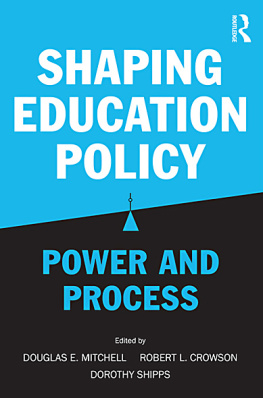SHAPING EDUCATION POLICY
Shaping Education Policy is a comprehensive overview of education politics and policy during the most turbulent and rapidly changing period in American history. Respected scholars review the history of education policy to explain the political powers and processes that shape education today. Chapters cover major themes that have influenced education, including the civil rights movement, federal involvement, the accountability movement, family choice, and development of nationalization and globalization. Sponsored by the Politics of Education Association, this edited collection examines the tumultuous shifts in education policy over the last six decades and projects the likely future of public education. This book is a necessary resource for understanding the evolution, current status, and possibilities of educational policy and politics.
Douglas E. Mitchell is Professor of Education at the University of California, Riverside.
Robert L. Crowson is Professor of Education and Policy at Peabody College, Vanderbilt University.
Dorothy Shipps is Associate Professor of Public Affairs and Education at Baruch College, City University of New York.
SHAPING EDUCATION POLICY
Power and Process
Edited by Douglas E. Mitchell, Robert L. Crowson, and Dorothy Shipps

NEW YORK AND LONDON
First published 2011
by Routledge
711 Third Avenue, New York, NY 10017
Simultaneously published in the UK
by Routledge
2 Park Square, Milton Park, Abingdon, Oxon OX14 4RN
Routledge is an imprint of the Taylor & Francis Group, an informa business
This edition published in the Taylor & Francis e-Library, 2011.
To purchase your own copy of this or any of Taylor & Francis or Routledges collection of thousands of eBooks please go to www.eBookstore.tandf.co.uk.
2011 Taylor & Francis
The right of the editors to be identified as the authors of the editorial material, and of the authors for their individual chapters, has been asserted by them in accordance with sections 77 and 78 of the Copyright, Designs and Patents Act 1988.
All rights reserved. No part of this book may be reprinted or reproduced or utilised in any form or by any electronic, mechanical, or other means, now known or hereafter invented, including photocopying and recording, or in any information storage or retrieval system, without permission in writing from the publishers.
Trademark Notice: Product or corporate names may be trademarks or registered trademarks, and are used only for identification and explanation without intent to infringe.
Library of Congress Cataloging in Publication Data
Mitchell, Douglas E.
Shaping education policy : power and process / edited by Douglas E.
Mitchell, Robert L. Crowson, Dorothy Shipps. 1st ed.
p. cm.
1. Education and stateUnited States. 2. School management and
organizationUnited States. 3. Community and schoolUnited
States. 4. Home and schoolUnited States. I. Crowson, Robert L. II.
Shipps, Dorothy. III. Title.
LC89.M56 2011
379.73dc22
2011000349
ISBN 0-203-83735-5 Master e-book ISBN
ISBN 13: 978-0-415-87504-2 (hbk)
ISBN 13: 978-0-415-87505-9 (pbk)
ISBN 13: 978- 0-203-83735-1 (ebk)
In memoriam
William Lowe Boyd
19352008
We remember his leadership,
His insightfulness,
His mentorship of young scholars,
His appreciation of music, and
Above all, his generous and gentle character.
CONTENTS
Douglas E. Mitchell
|
Betty Malen
|
David K. CohenandSusan L. Moffitt
|
Jane HannawayandJoel Mittleman
|
Douglas N. HarrisandJohn F. Witte
|
Tedi K. MitchellandDouglas E. Mitchell
|
Carolyn A. BrownandBruce S. Cooper
|
David N. PlankandBob L. Johnson, Jr.
|
Heinz-Dieter Meyer
|
Kenneth K. WongandEmily Farris
|
Robert L. Crowson,Claire E. Smrekar, andJo Bennett
|
Dorothy Shipps
|
Douglas E. Mitchell,Dorothy Shipps, andRobert L. Crowson
|
FOREWORD
Paul Peterson
In the late 1950s, the American educational system was the envy of the world. Though it had many wartssouthern schools were racially segregated, disabled students were excluded, and school facilities were often hopelessly inadequate the nations schools could boast a larger high school graduation rate than that of any other major industrial country. Secondary schooling attendance had exploded in the 1920s and 1930s so that already, by 1940, some 72% of adolescents were going to school, a percentage that grew to 90% by 1960. College enrollment rates more than doubled between 1940 and 1970. (These and the following statistics are taken from Peterson, 2010). Schools had helped propel the United States from a developing country to the worlds superpower.
Today, elementary and secondary schools in the United States no longer appear exceptional. In recent decades, other countries have been encouraging their young people to remain in school for ever longer periods of time, but U.S. graduation rates have remained constant. Once the world leader, the United States now stands at just the industrial world average. Nor are those who remain in school learning more. According to various international measures of high school student performance, Americas schools range from just average in reading to well below that level in science and math. At age 17, White students score no better in reading in 2004 than they did in 1971. African Americans and Hispanic high school students made noticeable progress in reading during the 1970s and 80s, but their performance has slipped since then. The story is much the same in math.
Why has a once-dynamic educational system turned stagnant, or worse? Has it been a change in pedagogical practice? Have the necessary resources been lacking? Was it the racial turmoil that accompanied the efforts to desegregate the schools? Was it the rise of powerful teacher unions who won the right to bargain collectively? Have school systems become overly centralized, professionalized, legalized and bureaucratized? Did the school reforms of the past half century have consequences their advocates never anticipated? Answers to such questions are explored in the pages that follow, though no predetermined conclusion is forced. But on one fact almost all authors agree: Power over schooling has over the last 50 years shifted steadily from lower to higher levels of government.
From Local Schools to Central Control
The system the reformers sought to reform was in the beginning modeled on Scottish and English arrangements marked by voluntary enrollments, fee-based education, religious instruction, and local control. A march toward a more centrally regulated, secular, bureaucratized educational system has taken place through a series of struggles, each of which shifted control of education away from parents and localities to professionals operating within larger legal entitieslarge districts, collective bargaining agreements, state governments, court jurisdictions, and federal executive agencies. Centralization became the almost inevitable byproduct of school reform, simply because reformers sought maximum power to carry their desires into effect.













